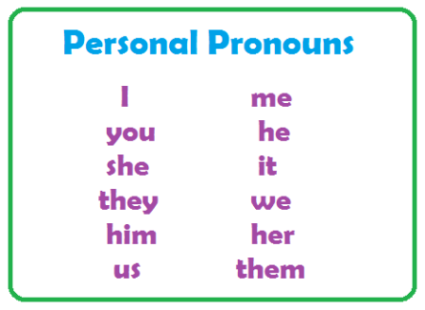Types of Pronouns: Personal Pronouns
One of the most common parts of speech used in everyday conversation and writing, whether formal or informal, is the pronoun. In this article, the most common type of pronoun will be discussed—the personal pronoun.
Definition of Personal Pronouns
Personal pronouns can be simply defined as the type of pronouns used to replace a specific noun in a sentence. It can be used to take the place of a person, an animal, a thing, or a place, in order to avoid stating the same noun over and over again in the same text.
Explanation of Personal Pronouns
In a sentence, a personal pronoun can be used in place of a noun that is mentioned earlier in that sentence. You should also know that personal pronouns can have two functions—they can act as either the subject or the object in the sentence. With this, it can be further categorized into two kinds: the subjective personal pronoun (used as the subject) and the objective personal pronoun (used as the direct object, indirect object, or object of the preposition).
In order to use personal pronouns effectively and avoid confusion, you must make sure that the personal pronoun that you will use agrees in number (singular: I, you, me, she, he, it, him, her; plural: you, they, we, them, us), gender (feminine, masculine, neuter), and person (first person, second person, third person).
Examples of Personal Pronouns
The underlined words in the sample sentences below show how personal pronouns are used.
- He bought a new gaming laptop.
- Can you take him to the hospital?
- You gotta be kidding me!
- Honestly, I think he won’t make it.
- They are the worst groupmates I ever had!
- Will you join with us?
- She pushed the little kid down the stairs.
- We are going to the coffee shop. Do you want to come with us?
- Michael and I got it from the novelty shop.
- Get them something to drink.
Examples of Personal Pronouns in Literature
All of the sentences from famous literary works provided below contain examples of personal pronouns (underlined words).
- “Friendship is born at that moment when one person says to another: “What! You too? I thought that no one but myself . . .”” – C.S Lewis, The Four Loves
- “You love me. Real or not real?”
I tell him, “Real.” – Suzanne Collins, Mockingjay - “That’s the thing about pain,” Augustus said, and then glanced back at me. “It demands to be felt.” – John Green, The Fault in Our Stars
- “In vain have I struggled. It will not do. My feelings will not be repressed. You must allow me to tell you how ardently I admire and love you.” – Jane Austen, Pride and Prejudice
- “So, I love you because the entire universe conspired to help me find you.” – Paulo Coelho, The Alchemist
- “I believe that life is a game, that life is a cruel joke, and that life is what happens when you‘re alive and that you might as well lie back and enjoy it.” – Neil Gaiman, American Gods
- “Why did you do all this for me?’ he asked. ‘I don’t deserve it. I‘ve never done anything for you.’ ‘You have been my friend,’ replied Charlotte. ‘That in itself is a tremendous thing.” – E.B White, Charlotte’s Web
- “What I want is to be needed. What I need is to be indispensable to somebody. Who I need is somebody that will eat up all my free time, my ego, my attention. Somebody addicted to me. A mutual addiction.” – Chuck Palahniuk, Choke
- “Nothing of me is original. I am the combined effort of everyone I‘ve ever known.” – Chuck Palahniuk, Invisible Monsters
- “It‘s just that I don’t want to be somebody’s crush. If somebody likes me, I want them to like the real me, not what they think I am. And I don’t want them to carry it around inside. I want them to show me, so I can feel it too.” – Stephen Chbosky, The Perks of Being a Wallflower
Function of Personal Pronouns
The main function of the personal pronoun is to take the place of a noun in a sentence. It can be used as a subject or an object (direct, indirect, object of the preposition) in a text/speech, and can serve as a good way to help you avoid repetition of specific nouns. Thus, it can be considered as a tool that can help ease the flow of words and sentences in your speech or writing.
